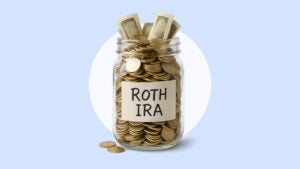Why a Roth IRA might be the MVP of retirement savings

The Roth IRA is a powerful retirement account that offers savers unique tax breaks, flexible withdrawal options, optimal wealth-transfer perks and more.
It’s easy to set up a Roth account on your own or with a financial advisor and Roth IRAs are available to all working Americans and their spouses.
5 Roth IRA benefits
Here are five top benefits of a Roth IRA and why you should seriously consider getting a Roth IRA.
1. Tax-free growth and withdrawals
Let’s start with the biggest advantages of a Roth IRA, the ones that will keep the government out of your pocket permanently — tax-free growth and withdrawals.
“Roth IRAs are one of the best vehicles to save for retirement, given the tremendous benefit of tax-free growth,” says Elizabeth Evans, CFP and managing partner of Evans May Wealth in the Indianapolis area.
With a Roth IRA, you contribute after-tax money to the account, so you don’t get to avoid tax on your contributions, as you might with a traditional IRA. In exchange, your money grows tax-free and you’ll be able to withdraw it tax-free at retirement, defined as age 59½ or older.
The Roth IRA is a powerful way to grow your nest egg. But even those who have a traditional IRA may convert it to a Roth IRA and reap the benefits by doing a backdoor Roth conversion.
Converting a traditional IRA to a Roth IRA will likely trigger a tax bill. A financial advisor who is well-versed in tax matters can identify ways to minimize the hit.
2. Withdraw contributions penalty-free at any time
Unlike some retirement accounts that can ding you with penalties if you need to withdraw some money before retirement, the Roth IRA allows you to withdraw contributions at any time tax- and penalty-free five years after opening the account.
The key word here is contributions, that is, only the money you’ve added. If you take out earnings before you’re able to make a qualified withdrawal, you’ll owe taxes on them.
If you run into an emergency and need to access cash, a Roth IRA offers you a lot of flexibility. While experts advise not tapping your account, sometimes you don’t have a choice and it can be a relief to know that you can do so without the extra burden of taxes and penalties.
3. Pass down your money tax-free to heirs
The Roth IRA is a great wealth transfer vehicle because it allows you to pass any money in the account tax-free to your heirs.
Depending on the circumstances, heirs could still grow the account tax-free for years, maybe decades, while other heirs may need to distribute all the assets in the account within 10 years of the original owner’s death. But because that money is in a Roth IRA, any distributions will ultimately be tax-free to recipients.
The rules around inherited IRAs are quite tricky, however, so it’s important to understand them before diving in. But the Roth IRA puts a ton of tax-free options at the disposal of your heirs.
If you’re looking for expert guidance when it comes to planning for retirement or managing your investments, Bankrate’s AdvisorMatch can connect you to a CFP® professional to help you achieve your financial goals.
4. No age limit for a Roth IRA
As long as you have earned income from working (not merely investments), you can contribute to a Roth IRA at any age. Even children can have custodial Roth accounts.
Your contribution can be no more than $7,000 (in 2025) or your earned income, whichever is less. However, those over age 50 can contribute an extra $1,000 per year.
In addition, non-working spouses can contribute to a Roth IRA if they have a spouse who earns income. Here are the details on the spousal IRA.
5. Roth IRAs don’t have required distributions
Traditional IRAs impose required minimum distributions (RMDs) as do traditional 401(k)s. You don’t have to worry about RMDs in a Roth IRA or its Roth 401(k) cousin.
As the name suggests, RMDs force you to take a minimum distribution from your account annually the year after you turn 73. With an RMD, you’ll be forced to withdraw money whether you need it or not. And that means taxes and a halt to the tax-advantaged compounding inside the account.
But the Roth IRA lets you avoid required minimum distributions entirely, allowing your money to continue compounding as long as you like, even passing that money untouched to your heirs tax-free.
What is the downside of a Roth IRA?
While there are many benefits of Roth IRAs, there are a few drawbacks to be aware of.
- The most obvious disadvantage of contributing to a Roth IRA is that your contributions are made with after-tax dollars, unlike traditional IRAs or 401(k) plans. This means you won’t get a tax benefit in the year you make the contribution, but it will ultimately benefit you down the road when you won’t owe taxes on withdrawals during retirement.
- Another disadvantage of Roth IRAs is that not everyone can contribute to them. Once you reach a certain level of income, the amount you can contribute declines and is eventually eliminated at a certain level of income. However, as mentioned above, there are ways around this cutoff by using a backdoor Roth IRA.
Wondering if a Roth IRA is right for you? How much of your retirement savings should be invested in a Roth account? Ask a financial advisor!
Bottom line
The Roth IRA is one of the best retirement accounts around, offering tons of flexibility as well as the ability to grow your money tax-free, potentially for decades.
— Bankrate’s Dayana Yochim contributed to an update.
Editorial Disclaimer: All investors are advised to conduct their own independent research into investment strategies before making an investment decision. In addition, investors are advised that past investment product performance is no guarantee of future price appreciation.
Why we ask for feedback Your feedback helps us improve our content and services. It takes less than a minute to complete.
Your responses are anonymous and will only be used for improving our website.





